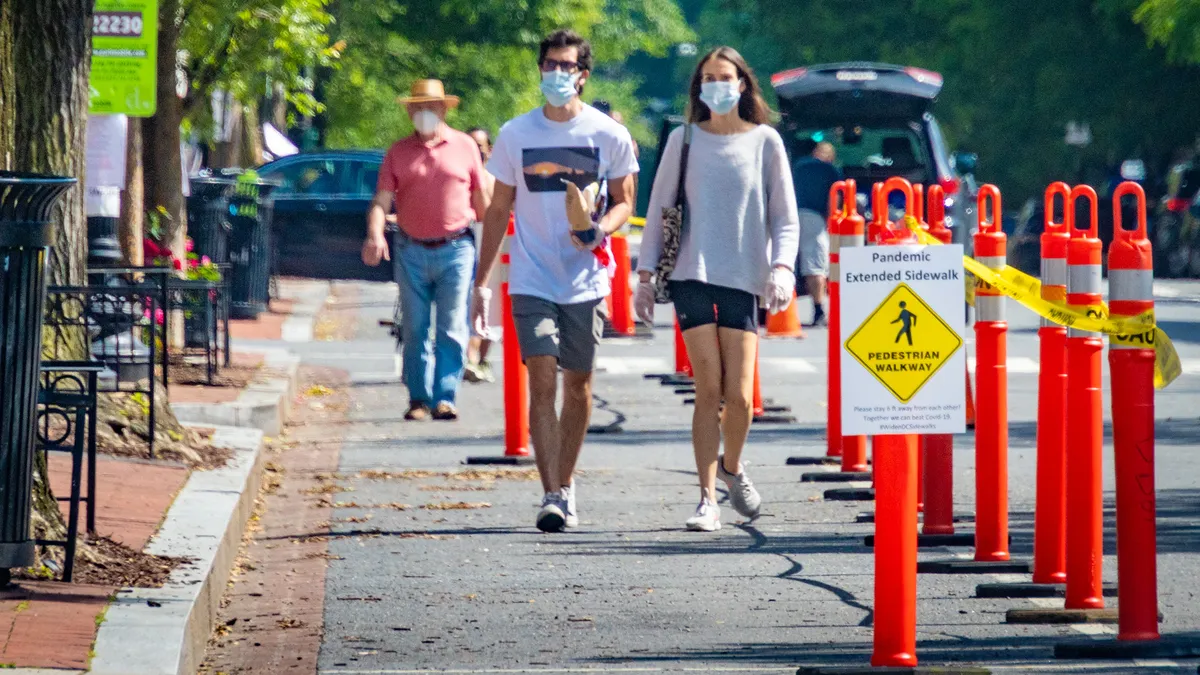Dive Brief:
- The National League of Cities (NLC) is calling on Congress to issue $500 million in direct and flexible funding to local governments of all sizes over the next two years, NLC President Joe Buscaino said on a Tuesday press call, calling the move "appropriate and necessary."
- The press call was held to discuss the findings of NLC's new COVID-19 Local Impacts Survey of 1,100 U.S. municipalities. Key findings include: 1.5 million public sector jobs have been lost since March; 70% of cities have still not received support from the Coronavirus Aid, Relief, and Economic Security (CARES) Act; and personal protective equipment (PPE) and disinfecting services have been the most significant unexpected expenditures for 70% of cities.
- The survey also found the number of cities that are adjusting or cutting spending in the following areas:
Dive Insight:
NLC and the U.S. Conference of Mayors conducted a survey in April of more than 2,400 local officials, of which 88% said they anticipate the coronavirus pandemic to lead to "painful reductions in revenue this year" — a prediction that turned into reality.
While the $2 trillion CARES Act promised local government funding when it was passed in March, only 36 cities of more than 19,000 nationally received funding for meeting a population requirement of 500,000 or more residents. In many states, including South Carolina, no city or town received CARES Act funding.
"The funding from the CARES Act offered an important lifeline for cities, but only if you were lucky enough for your city to receive funds," said Kathy Maness, Lexington, SC council member and first vice president of NLC, on the press call. "My city hasn’t received any yet."
Maness said this lack of more widespread funding has left NLC "fired up and ready to go fight," and the findings of the local impacts survey helped to highlight the reality of the situation for cities: If Congress fails to provide more federal funding to America's cities and towns, the impacts will be catastrophic.
Critical infrastructure is a key at-risk area as 65% of surveyed cities look to delay or cancel their infrastructure projects, which could create an "economic ripple effect" if actions aren't taken to support capital expenditures and projects, Maness said. "I hate to say it, but the latest COVID-19 financial impact data we’re sharing with you today is painting a dire picture for our infrastructure future."
She acknowledged that House Democrats passed a $1.5 trillion infrastructure bill this week — a larger version of the previously unveiled Moving Forward Act — but said she hopes to see the bill "go further and include more robust language" around investments.
Vince Williams, mayor of Union City, GA and second vice president of NLC, encouraged federal leaders to look past the numbers to the people impacted by a lack of funding, such as family, friends, neighbors, communities and dedicated workers.
“One of the things I want to share today to all of our federal representatives: Many of you did not grow up or do not live in a city [of 500,000 residents]," Williams said on the call. "You were sent to Washington to do the bidding for small towns that groomed you, that prepared you, that supported you each and every step of the way.”
And it's not just federal leaders who must step up to the plate, the speakers said. NLC found that 24 states have yet to announce if they plan to distribute their CARES Act funds to local governments. Meanwhile, Florida, Hawaii, North Carolina and Missouri have transferred their CARES Act funds to county governments, leaving local governments completely out of the equation, said Williams.
This issue is exacerbated when the promise of more federal funding is unclear, he added.
"The problem is, if states don’t know when or even if more money is coming, they aren’t comfortable allocating money to cities, and cities are left with nothing," Williams said. "Is that fair? That’s something we need to ask ourselves as leaders."
NLC leaders also expressed the importance of thinking ahead to unexpected budgetary shortfalls down the road, as federal and state leaders continue to break down funding allocations. Most surveyed cities (70%) said PPE and disinfecting services — especially as cities reopen — were some of their most significant yet unexpected expenditures, followed by equipment and tech (36%), sunk programming and staffing costs (33%) and overtime pay for staff (31%).
As speakers on the call wrapped up their remarks, NLC CEO and Executive Director Clarence Anthony reemphasized the need for more support, but also prepped listeners for Congress' potential failure to respond.
“If we don’t get that direct funding, looking at this data, we’ve gotta brace ourselves as leaders [and] brace our residents," he said. "Because a storm is coming.”
To keep up with all of our coverage on how the new coronavirus is impacting U.S. cities, visit our daily tracker.












